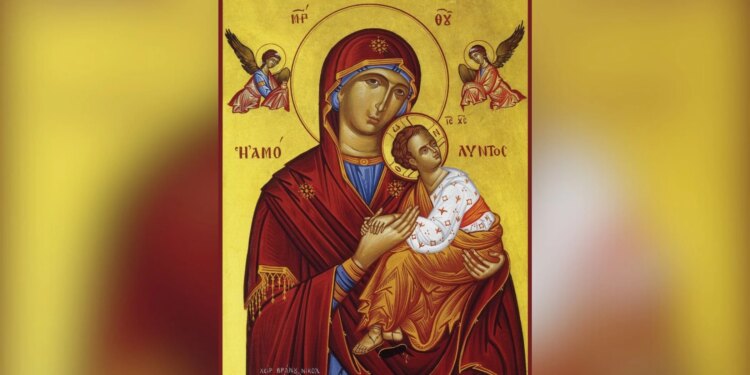CNA Staff, Dec 24, 2024 / 07:00 am
Earlier this month, the pro-abortion group “Catholics for Choice” stirred controversy online when it wrote in a tweet: “This holiday season, remember that Mary had a choice, and you should, too.”
The explicit pro-abortion message is meant to equate Mary’s choice to be the mother of God with a mother’s “choice” to have an abortion. “By explicitly seeking definitive consent from Mary to conceive of Christ, God empowered and uplifted her bodily autonomy,” the group claims on its website. “It’s clear that reproductive choice is God’s will.”
The Catholic Church, of course, has since its ancient beginnings forbidden abortion on the grounds that it constitutes homicide.
The Catechism of the Catholic Church states: “Since the first century the Church has affirmed the moral evil of every procured abortion. This teaching has not changed and remains unchangeable. Direct abortion, that is to say, abortion willed either as an end or a means, is gravely contrary to the moral law” (No. 2271).
Catholics for Choice, meanwhile, has been strongly criticized by Church leadership for its explicitly un-Catholic advocacy: Cardinal Timothy Dolan several years ago said the group “is not affiliated with the Catholic Church in any way,” does “not speak for the faithful,” and is “funded by powerful private foundations to promote abortion as a method of population control.”
Yet the group’s misleading advocacy inadvertently underscored a key aspect of Catholic doctrine, one that has been part of the Catholic faith since it began 2,000 years ago: that Mary did indeed have a choice to assent to God’s will and become the “Theotokos,” the mother of God.
‘Absolutely free’
Mark Miravalle, who holds the St. John Paul II Chair of Mariology at Franciscan University of Steubenville, told CNA that Mary was “absolutely free” in exercising the decision to become God’s mother on Earth.
“She was free in exercising God’s greatest gift of free will,” he said. To suggest otherwise, he said, would be to imply that “she was somehow coerced or that it was some form of predestination, one that doesn’t allow for the expression of what makes us human, which is our freedom.”
The theologian noted that it was “a malicious equivocation” for Catholics for Choice to “imply that Mary’s ‘yes’ choice to bring our Redeemer into the world bears any similarity or moral equivalence to the tragic ‘no’ choice of a woman that leads to the direct killing of an innocent human being.”
“Mary’s choice brings life and salvation,” he said. “The choice for abortion brings death and destruction. Morally, these two choices could not be more diametrically opposed, and thereby can never be honestly referred to as justification for the devastating evil of abortion.”
Marian theologian Father Edward Looney, who serves in the Diocese of Green Bay, Wisconsin, said the question of Mary’s freedom to choose could arise from the nature of the Immaculate Conception.
“Since she was chosen by God and God already had acted in her life with a prevenient grace, sparing her from original choice, one could rightly ask, did Mary have free choice?” he said.
Yet the Blessed Mother did indeed have free will to choose, Looney said.
“Her life was aligned with God to that extent that what God wanted for her she wanted,” he pointed out. “Aligning oneself with the will of God does not imply that one lacks free choice; rather it shows one wishes to cooperate with God and carry out his plan and will.”
“God’s ways are better than our ways,” he added. “Mary wanted to remain a virgin. She was willing to remain a virgin and yet be a mother.”
(Story continues below)
Subscribe to our daily newsletter
Catholic theologians have long cited Mary’s freely chosen assent as a model for all Catholics. Then-Pope Benedict XVI said in a 2006 homily that “in being loved, in receiving the gift of God, Mary is fully active, because she accepts with personal generosity the wave of God’s love poured out upon her.”
“In this too, she is the perfect disciple of her son, who realizes the fullness of his freedom and thus exercises the freedom through obedience to the Father,” the pope pointed out.
That theme can be seen over the centuries: St. Augustine of Hippo, for instance, wrote that Mary effectively served as the mother of the Church, “because she cooperated by her charity, so that faithful Christians … might be born in the Church.”
Looney, meanwhile, cited the homily “In Praise of the Virgin Mother” by St. Bernard. In it, the 10th-century priest summed up the Virgin Mother’s response to the angel by imploring her: “Answer quickly, O Virgin. Reply in haste to the angel or rather through the angel to the Lord.”
“Answer with a word, receive the Word of God,” Bernard wrote. “Speak your own word, conceive the divine Word. Breath a passing word, embrace the eternal Word.”
Credit: Source link





